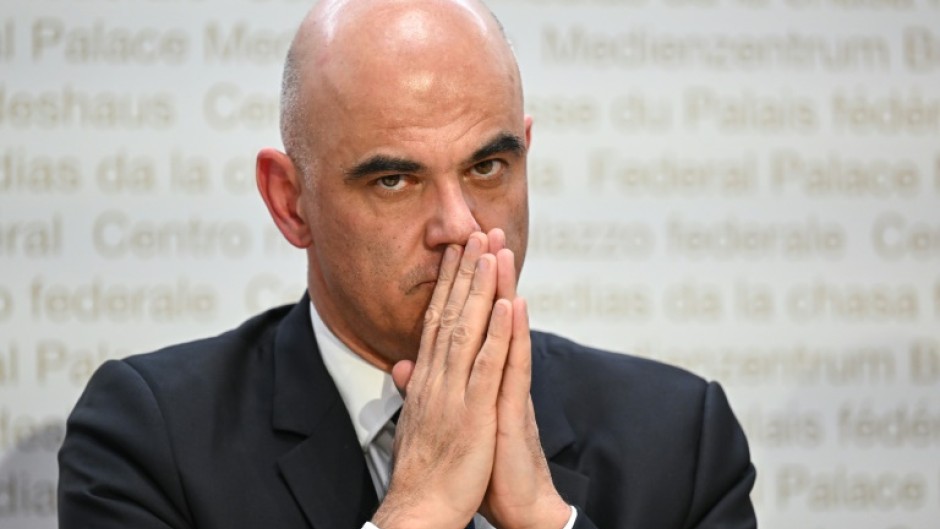
UBS has agreed to take over its troubled Swiss rival Credit Suisse after doubling its offer to $2 billion, the Financial Times reported amid urgent talks Sunday aimed at sparing the embattled bank from a bloodbath when the markets reopen.
The two largest banks in the wealthy Alpine nation famed for its banking prominence have been in negotiations throughout the weekend, with the government, the central bank and financial regulators all involved.
The Swiss government announced it would hold a press conference at 7:30pm (1830 GMT), after President Alain Berset, other government ministers and the central bank chief, Swiss National Bank chairman Thomas Jordan, spent the day in talks at the finance ministry in the capital Bern.
The Financial Times newspaper, which was the first on Friday to report the prospect of Switzerland's biggest bank swallowing up Credit Suisse, said UBS had agreed to buy it for $2 billion, with its fellow Zurich-based lender having spurned an earlier offer of $1 billion.
The FT said shareholders would get 0.50 Swiss francs ($0.54) per share, with the deal to be done on Sunday before the markets open in Asia.
After suffering heavy falls on the stock market last week, Credit Suisse's share price closed Friday at 1.86 Swiss francs, with the bank worth just over $8.7 billion.
Credit Suisse's share price has tumbled from 12.78 Swiss francs in February 2021 due to a string of scandals that it has been unable to shake off.
- Time is money -
UBS was being urged by the authorities to get a deal over the line before the stock exchange reopens at 0800 GMT on Monday, in a bid to reassure investors and avoid a wave of contagious panic on the markets.

The Swiss authorities felt they had no choice but to push UBS into overcoming its reluctance, due to the enormous pressure exerted by Switzerland's major economic and financial partners, fearing for their own financial centres, said Blick newspaper.
A merger of this scale -- involving swallowing up all or part of a bank arousing growing investor unease -- would normally take months.
While under Swiss rules, UBS would typically have to consult shareholders over six weeks, it could use emergency measures to skip the consultation period and a shareholder vote, the FT said, citing unnamed sources.
- 'Merger of the century' -
The SonntagsZeitung newspaper called it "the merger of the century".

"The unthinkable becomes true: Credit Suisse is about to be taken over by UBS," the weekly said.
The government, FINMA and the SNB "see no other option", it claimed.
"The pressure from abroad had become too great -- and the fear that the reeling Credit Suisse could trigger a global financial crisis," it said.
David Benamou, chief investment officer of Paris-based Axiom Alternative Investments, said: "The Credit Suisse management, even if forced to do so by the authorities, would only choose (a UBS takeover) if they have no other solution."
The Swiss Bank Employees Association said there was "a great deal at stake" for the 17,000 Credit Suisse staff, "and therefore also for our economy".
"In addition, tens of thousands of jobs outside of the banking industry would potentially be at risk," it added, calling for a task force to be established to manage the situation.
- Too big to fail? -
Like UBS, Credit Suisse is one of 30 banks around the world deemed to be Global Systemically Important Banks -- of such importance to the international banking system that they are considered too big to fail.

But the market movement seemed to suggest the bank was being perceived as a weak link in the chain.
"We are now awaiting a definitive and structural solution to the problems of this bank," French Finance Minister Bruno Le Maire told Le Parisien newspaper.
Amid fears of contagion after the collapse of two US banks, Credit Suisse's share price plunged by more than 30 percent on Wednesday to a new record low of 1.55 Swiss francs. That saw the SNB step in overnight with a $54-billion lifeline.
After recovering some ground Thursday, its shares closed down eight percent on Friday at 1.86 Swiss francs as the Zurich-based lender struggled to retain investor confidence.
In 2022, the bank suffered a net loss of $7.9 billion and expects a "substantial" pre-tax loss this year.
By Fabrice Coffrini With Robin Millard In Geneva

